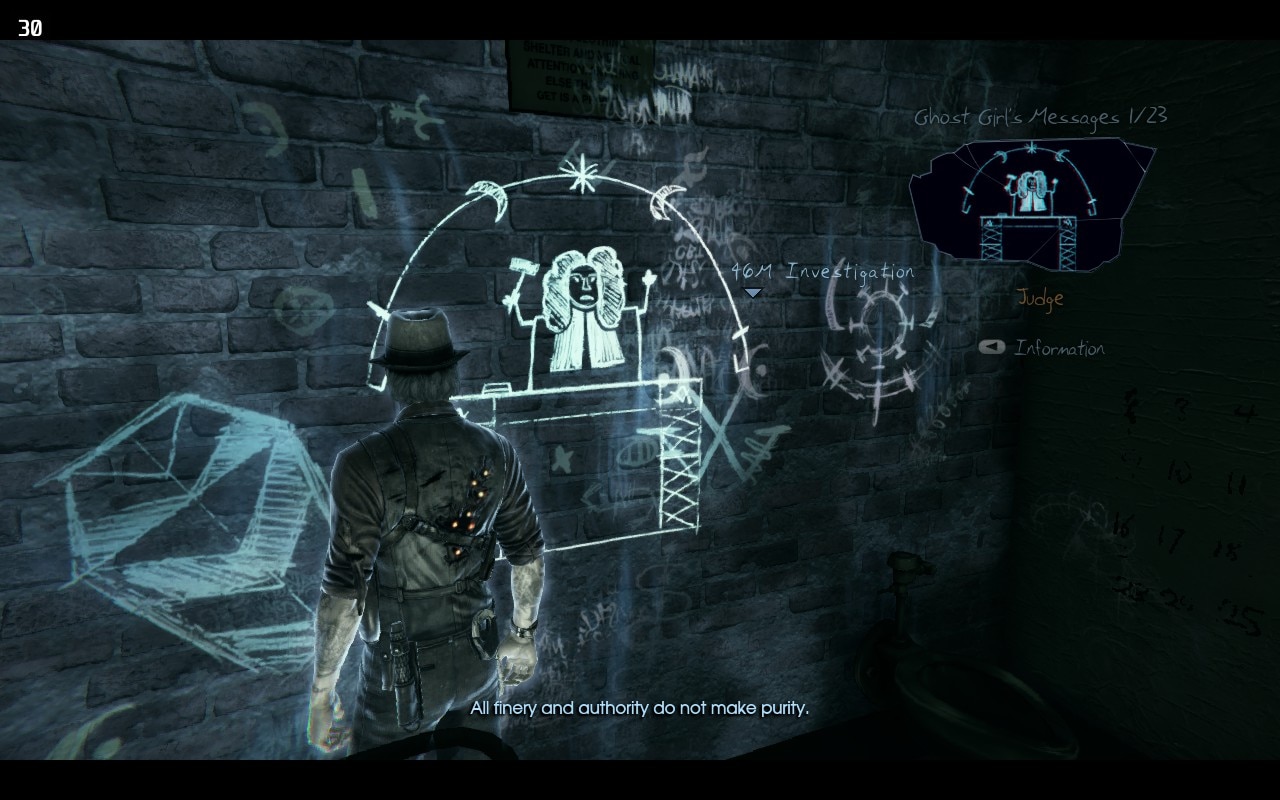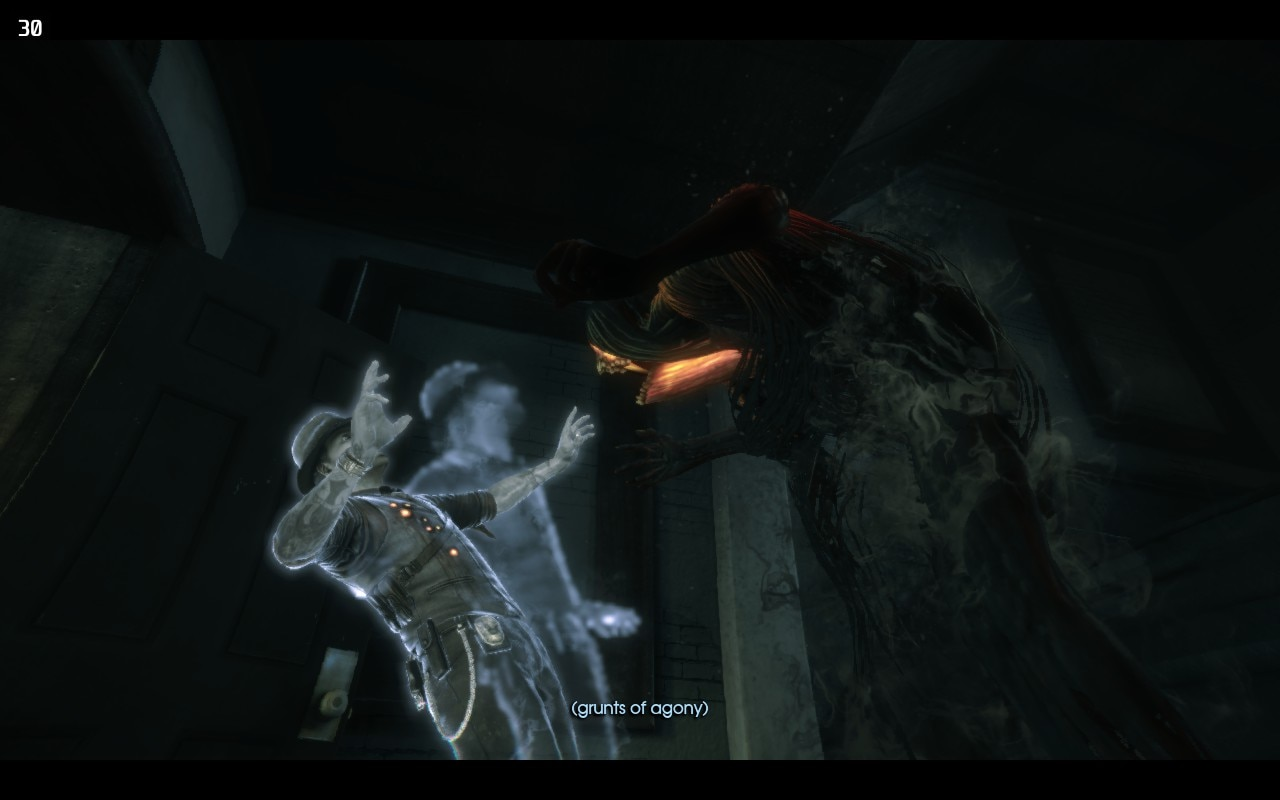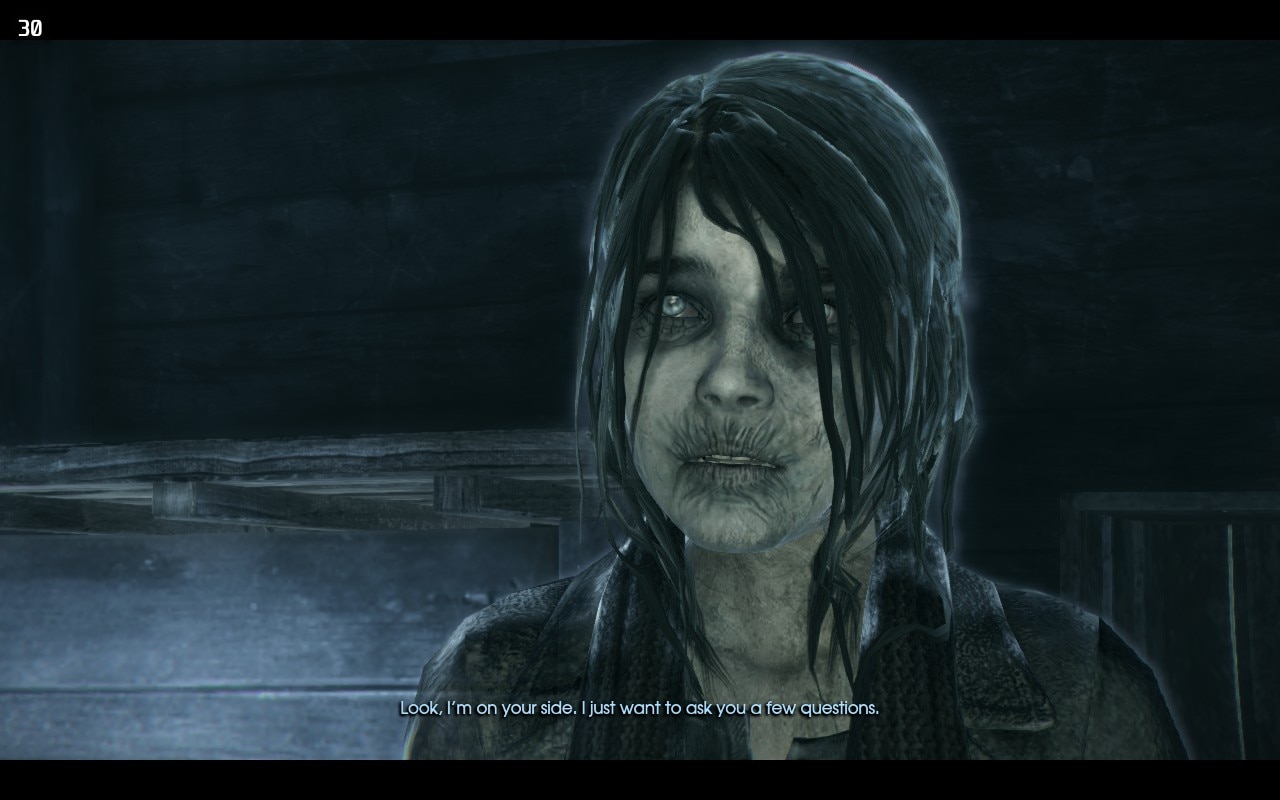Murdered: Soul Suspect
Developer: Airtight Games
Publisher: Square Enix, 2014
In supernatural mystery adventure Murdered: Soul Suspect, you guide Detective Ronan O'Connor as he investigates his final case: his own murder. Set in a fictionalised version of Salem, Massachusetts, the game soon sees Ronan in pursuit of the mysterious Bell Killer, a serial murderer obsessed by the town's supernatural past. The game's time period is ambiguous. You don't see anyone on a mobile phone and and you'll find CRT TVs and chunky early TFT computer screens, which could put this somewhere in the late 90s. But it's all an alternative reality anyway, primarily to give the game an excuse not to hove too close to Salem's real history.
Designed by a Japanese team to appeal to western – and specifically US – audiences, Murdered: Soul Suspect is populated by ghosts with unresolved questions about their mortal lives, and often deaths. That's Ronan's own motivation, as well as the root of optional mysteries that you can solve for other ghosts that he encounters.
At heart, this is a visual novel in a 3D engine, and it's a solid approach the physicality of investigating murder scenes. Ronan might not be able to communicate with most living humans, but his ghostly powers present other means of finding the information he needs, from interacting with vestigial sprit memories that occupy a place, to possessing and influencing humans and other animals, to accessing hidden areas by walking through walls. As the game progresses, you'll unlock an increasing array of these ghostly powers.

Unusually for a generally thoughtful narrative adventure game, there are moments of action. The game contains both passive and active threats. Passive threats include geography that's lethal to Ronan. Named ‘Lost Souls’, these are sucking holes in the world, capable of disintegrating a ghost's essence. The active threats are demons, once-human ghosts that have lost their souls and sense of identity by lingering too long without understanding their unresolved mysteries. Demons stalk certain areas of the game and will destroy Ronan on sight.
You can avoid them, but this isn't really a stealth game, and you'll need to get rid of them in order to thoroughly search the areas they occupy. At least they don't respawn. The best option is to sneak up and destroy them by completing a quicktime button-press that pops up on screen. Although the demons add real tension to some areas and there are a variety of tactics you can use against them, such as distracting them ghost crows, they can be annoying when you encounter them towards the end of a long sequence that must repeated if they destroy you. This is most notable is part of the mental hospital where three demons stalk in close proximity to one another and area's the helpful ghost crow isn't immediately apparent.

The game evokes shades of police procedural TV shows as well as supernatural thrillers, alongside the crime scene investigation elements of more traditional mystery visual novels. However, its puzzles are a weak point. Once you've gathered all the evidence you can find at a scene, you'll have to pick between one and four elements that are relevant to the case at hand, such as working out new leads or establishing a relevant piece of evidence.
Finding the next lead in each of these investigations makes the story to move on and causes new events to unfold. Selecting the right answer is usually trivial, although a couple of sequences rely on your reading of image cues about emotion on the face of a character, which can be a challenge. Finding other clues depends on you carrying out an extra interaction, such as clicking on a computer screen while possessing someone, which isn't always immediately obvious.
3D world feels suitably alive. NPCs, each with a couple of different thoughts that you can read, wander around, interspersed with a healthy number of named characters. The city of Salem feels like a character as you wander its streets which, to your undead eyes, are filled with ghostly objects, buildings and people from the past, as well as the present. Salem serves as a hub world connecting the different locations you'll investigate.
The fact that you can re-enter locations that you've already completed the main objectives makes the world feel more open. Major investigation locations are large, but gated off until you get to the relevant plot beat.
Navigating the town of Salem can be a challenge, as its memory-haunted streets are hard to distinguish and identify the city's landmarks, even after several hours of play. You'll find modern roads blocked off parts of decaying or burning buildings that have been boarded up for years, and rooms that can only be accessed by someone with the ability to walk through walls. If that's an atmosphere that appeals to you, then this game is drenched in it.
While that adds to the sense of ghostly remnants of the past being layered upon the present, it's not particularly helpful when it comes to hunting for elusive objects. Fans have made maps, and, once you've tired of hunting for items by yourself, I strongly suggest using them. Many of these – a cemetery, a mental hospital, a church – are predictable features of a ghost story, but this feels more like comfort than cliche, and ties in well with both the story and its setting.

As well as the main plot and NPC ghosts that need help resolving their own mysteries, Murdered: Soul Suspect contains a variety of haunting little ghost stories, each with its own animated cutscene. They're all unlocked by finding ghostly memory-objects scattered around the expansive levels. This gives you an extra incentive to explore very thoroughly and, at times, to re-enter an area that you've just completed. For example, a new skill you obtain towards the end of the cemetery allows you to find an object towards the beginning of the zone. It's a glorified easter egg hunt, but in a game so focused on story, the opportunity to get more story is welcome, even if your experience of these extra narratives, once unlocked, is entirely passive.
The main plotline unfolds at a good place, with both cutscenes and found memories tying current events into the past of both Ronan, his relationships, and the city itself as you come closer to uncovering the killer. The game received mediocre reviews at the time of release – it has a Metacritic score of just 59. But over 10,000 Steam users have between them kept it at a Very Positive rating for years, and that's probably because, more than being a good game, Murdered: Soul Suspect is a good story and a compelling interactive experience.
I played entirely on the Steam Deck, and while its compact screen probably didn't help the experience of navigating Salem, this is an excellent pickup and play game to work through over the course of a few weeks..
Verdict
More than the sum of its parts, Murdered: Soul Suspect conveys an engagingly mysterious ghost story and a genuine sense of place, despite some weak game mechanics.
Important addendum: you can't pet it, but you can possess the cat. (Nothing bad happens to the cats of this game.)

Addendum to the addendum: You can disable the demons if you'd like to play this as the chill mystery game that it was apparently designed to be. See this Steam discussion page: https://steamcommunity.com/app/233290/discussions/0/618459297889916876/
#LinuxGaming #SteamDeck #ActionAdventure #SteamPlay #MurderMystery #ACAB